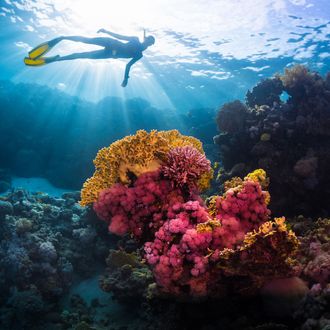
Your sunscreen may be killing the coral reefs. A study shows that a common sunscreen ingredient called oxybenzone is harmful to the underwater ecosystem, reports Self.com. The National Park Service adds that 4,000 to 6,000 tons of sunscreen annually enter reefs, from sunscreen-wearing people in the water. Sunscreen can “awaken coral viruses,” which affects the coral’s algae production, leaving it robbed of its vibrant color, and weak. Other reports released earlier this month show that two-thirds of Australia’s Great Barrier Reef is now bleached, says Vox.com.
Some scientists say that the sunscreen research is too preliminary to be conclusive and that a number of factors including rising sea temperatures are more to blame for the sick coral. But still, Hawaii state senator Will Espero has introduced a bill that would ban the sale of sunscreen containing oxybenzone and octinoxate (another sunscreen ingredient identified in a separate Italian study as being harmful to coral) to the state’s legislature.
“We could do a study but that would mean everything would be delayed for another 10 to 12 months. Many of us believe that we need to take action now,” Espero told local press, of the bill’s urgency. Hawaii’s legislative session has another two weeks, making it possible that the state could be the first to pass a bill of this nature. Until then, the National Park Service says, “If it’s on your skin, it’s on the reef!” and suggests that the closest thing to a reef-friendly sunscreen is a mineral option containing titanium oxide, or zinc oxide, that has not been proven to be harmful to coral. Pack one of those the next time you go snorkeling for the ’gram.


